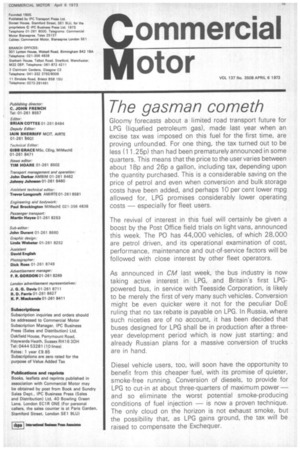The gasman cometh
Page 17

If you've noticed an error in this article please click here to report it so we can fix it.
Gloomy forecasts about a limited road transport future for LPG (liquefied petroleum gas), made last year when an excise tax was imposed on this fuel for the first time, are proving unfounded. For one thing, the tax turned out to be less (11.25p) than had been prematurely announced in some quarters. This means that the price to the user varies between about 18p and 26p a gallon, including tax, depending upon the quantity purchased. This is a considerable saving on the price of petrol and even when conversion and bulk storage costs have been added, and perhaps 10 per cent lower mpg allowed for, LPG promises considerably lower operating costs — especially for fleet users.
The revival of interest in this fuel will certainly be given a boost by the Post Office field trials on light vans, announced this week. The PO has 44,000 vehicles, of which 28,000 are petrol driven, and its operational examination of cost, performance, maintenance and out-of-service factors will be followed with close interest by other fleet operators.
As announced in CM last week, the bus industry is now taking active interest in LPG, and Britain's first LPGpowered bus, in service with Teesside Corporation, is likely to be merely the first of very many such vehicles. Conversion might be even quicker were it not for the peculiar DoE ruling that no tax rebate is payable on LPG. In Russia, where such niceties are of no account, it has been decided that buses designed for LPG shall be in production after a threeyear development period which is now just starting: and already Russian plans for a massive conversion of trucks are in hand.
Diesel vehicle users, too, will soon have the opportunity to benefit from this cheaper fuel, with its promise of quieter, smoke-free running. Conversion of diesels, to provide for LPG to cut-in at about three-quarters of maximum power— and so eliminate the worst potential smoke-producing conditions of fuel injection — is now a proven technique. The only cloud on the horizon is not exhaust smoke, but the possibility that, as LPG gains ground, the tax will be raised to compensate the Exchequer.












































































































